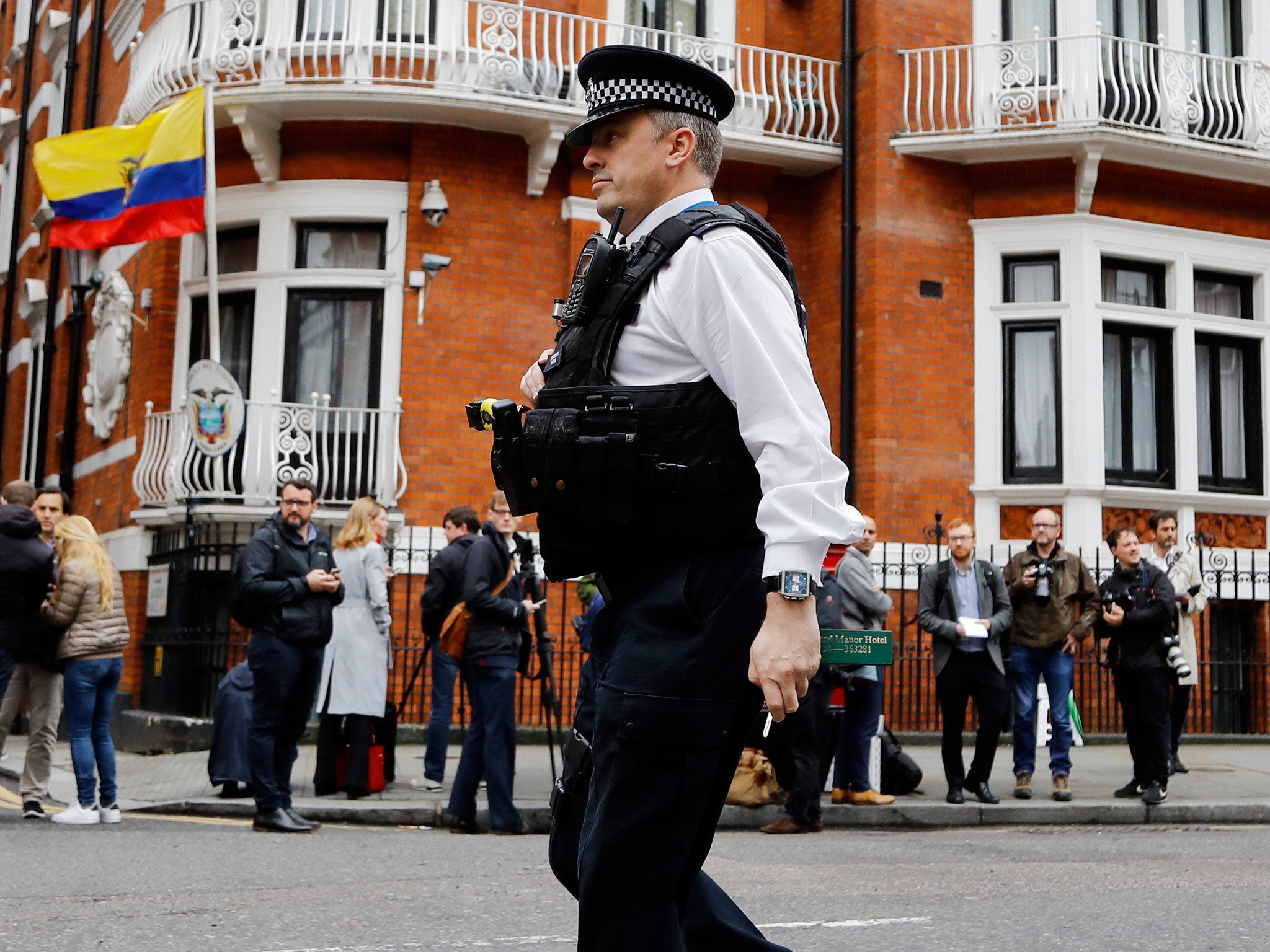Julian Assange will still be arrested if he leaves Ecuadorian embassy in London, Met Police confirms
Separate bail warrant stands after Sweden drops sexual assault investigation
Your support helps us to tell the story
From reproductive rights to climate change to Big Tech, The Independent is on the ground when the story is developing. Whether it's investigating the financials of Elon Musk's pro-Trump PAC or producing our latest documentary, 'The A Word', which shines a light on the American women fighting for reproductive rights, we know how important it is to parse out the facts from the messaging.
At such a critical moment in US history, we need reporters on the ground. Your donation allows us to keep sending journalists to speak to both sides of the story.
The Independent is trusted by Americans across the entire political spectrum. And unlike many other quality news outlets, we choose not to lock Americans out of our reporting and analysis with paywalls. We believe quality journalism should be available to everyone, paid for by those who can afford it.
Your support makes all the difference.Julian Assange will be arrested if he leaves the Ecuadorian embassy despite Sweden dropping its sexual assault investigation, British police have confirmed.
A spokesperson for the Metropolitan Police said that despite Sweden's European arrest warrant for the WikiLeaks founder being lifted, he was under a separate warrant for skipping bail.
"Westminster Magistrates' Court issued a warrant for the arrest of Julian Assange following him failing to surrender to the court on the 29 June 2012," a statement said.
"The Metropolitan Police Service is obliged to execute that warrant should he leave the Embassy."
As the Swedish investigation continued in December 2010, Mr Assange was jailed in Wandsworth Prison in isolation for 10 days and then put under house arrest for 550 days under powers granted by an international arrest warrant.
Scotland Yard stood down the 24/7 police presence outside the Ecuadorian Embassy building in 2015 but pledged to make “every effort” to arrest Mr Assange if he left.
There had been controversy over the escalating cost of the exercise, which was believed to be over £12 million.
The Met said its response "reflected the serious nature" of the original accusations, suggesting it would now scale down its efforts.
"Now that the situation has changed and the Swedish authorities have discontinued their investigation into that matter, Mr Assange remains wanted for a much less serious offence," a spokesperson said.
"The MPS will provide a level of resourcing which is proportionate to that offence. The MPS will not comment further on the operational plan."
The Australian activist sought asylum in the Ecuadorian Embassy while on bail in 2012, over fears the Swedish investigation would result in him being extradited to the US over leaked military documents and diplomatic cables.
Prosecutors dropped the probe after chief prosecutor Marianne Ny said there were no further avenues to pursue to take the investigation forward, in a court document seen by Reuters.
Mr Assange reacted to the news by tweeting a photo of himself smiling inside the Ecuadorian Embassy, where he has been living for almost five years.
The Ecuadorian government had sent Sweden a letter saying there had been a “serious failure” by the prosecutor, including a “lack of initiative” to complete inquiries.

It raised developments in the US since the election of Donald Trump as President, including a speech by CIA director Mike Pompeo describing WikiLeaks as a “hostile intelligence service”.
The letter argued that recent public declarations constituted an “obvious risk” for Mr Assange, who originally faced three sexual assault charges that he denied.
He was questioned by an Ecuadorian prosecutor with Swedish officials present inside the embassy in November, following a bilateral agreement that ended years of legal wrangling.
Prosecutors said the interview sparked further investigations but "no further measures remaining that are possible to take in order to further the investigation".
Ms Ny said the investigation could have progressed if Mr Assange was “formally served notice of the crimes of which he is suspected”, adding: “This was a measure which was to have been conducted during the interview in London but Mr Assange refused to make it possible.”
She said the probe could be reopened if Mr Assange returns to Sweden before statute of limitations ends in August 2020, but the move appears highly unlikely.

“The decision to discontinue the investigation is not because we've been able to make a full assessment of the evidence, but because we didn't see possibilities to advance the investigation,” Ms Ny added.
“So we won't make any statements on the issue of guilt”.
The UN had called on Swedish and British authorities to free Mr Assange from “arbitrary detention” in a report released last year, with the UK failing to overturn the findings on appeal.
“Now that all appeals are exhausted I expect that the UK and Sweden will comply with their international obligations and set me free,” Mr Assange said following the ruling.
“It is an obvious and grotesque injustice to detain someone for six years who hasn’t even been charged with an offence.”
Chelsea Manning, who provided WikiLeaks with classified intelligence on Iraq and Afghanistan that shocked the world, was freed from prison on Wednesday.
The transgender former US intelligence analyst left Fort Leavenworth, months after Barack Obama commuted her 35-year sentence as one of his final acts as President.

Join our commenting forum
Join thought-provoking conversations, follow other Independent readers and see their replies
Comments